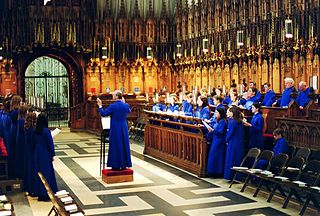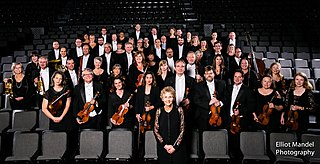
A choir is a musical ensemble of singers. Choral music, in turn, is the music written specifically for such an ensemble to perform or in other words is the music performed by the ensemble. Choirs may perform music from the classical music repertoire, which spans from the medieval era to the present, or popular music repertoire. Most choirs are led by a conductor, who leads the performances with arm, hand, and facial gestures.

Vespro della Beata Vergine, SV 206, is a musical setting by Claudio Monteverdi of the evening vespers on Marian feasts, scored for soloists, choirs, and orchestra. It is an ambitious work in scope and in its variety of style and scoring, and has a duration of around 90 minutes. Published in Venice as Sanctissimae Virgini Missa senis vocibus ac Vesperae pluribus decantandae, cum nonnullis sacris concentibus, ad Sacella sive Principum Cubicula accommodata, it is sometimes called Monteverdi's Vespers of 1610.

Brompton Oratory, also known as the London Oratory, is a neo-classical late-Victorian Catholic parish church in the Brompton area of the Royal Borough of Kensington and Chelsea, neighbouring Knightsbridge, London. Its name stems from Oratorians, who own the building, live nextdoor at the London Oratory, and service the parish. The church's formal title is the Church of the Immaculate Heart of Mary.

Saint Thomas Choir School is a boarding school located in Manhattan, New York, one of three world-wide that exclusively educate boy treble choristers, while requiring them to board at the school.
The Philip Jones Brass Ensemble, founded in 1951 by trumpeter Philip Jones, was one of the first modern classical brass ensembles to be formed. The group played either as a quintet or as a ten-piece, for larger halls. It toured and recorded extensively, and numerous arrangements were commissioned, many of which were bequeathed on Jones' death to the library of the Royal Northern College of Music.
The Choir of Trinity College, Cambridge is a mixed choir whose primary function is to sing choral services in the Tudor chapel of Trinity College, Cambridge. In January 2011, Gramophone named the choir the fifth best choir in the world.
The King's Consort is a British period music orchestra founded in 1980 by the English conductor and harpsichordist Robert King. The ensemble has an associated choral group, Choir of The King's Consort. Together, they have made over 90 recordings, largely on the Hyperion label, and sold over 1,000,000 discs. The orchestra performs concert seasons in the UK and tours internationally.
Boston Baroque is the oldest period instrument orchestra in North America. It was founded in 1973 by the American harpsichordist and conductor, Martin Pearlman, to present concerts of the Baroque and Classical repertoire on period instruments, drawing on the insights of the historical performance movement.
Seraphic Fire is a professional vocal ensemble in the United States, led by Artistic Director Patrick Dupré Quigley and Managing Director Matthew Kacergis, and based in Miami. Seraphic Fire's repertoire includes Gregorian chants, Baroque masterpieces, works by Mahler, and newly commissioned works by American composers.
London Concert Choir (LCC) is one of London's leading amateur choirs. The choir was formed in 1960, and the full-time membership consists of ca 150 singers of a wide range of ages.
Richard Andrew Sparks is an American choral conductor. He is one of the leading figures in choral music in the Pacific Northwest and in Scandinavian, especially Swedish a cappella, choral music.
The Magnificat Baroque Ensemble, or Magnificat, is an early music ensemble of voices and instruments specializing in the Baroque music of the 17th century under the artistic direction of Baroque cellist Warren Stewart. Stewart founded the ensemble in San Francisco in 1989 with Baroque harpsichordist Susan Harvey. Harvey resigned in 2000, and the group has remained under the sole musical direction of Stewart since then. The group derives its name from the first word of the Latin translation of the Canticle of Mary in the Gospel of Luke, Magnificat anima mea, "My soul magnifies the Lord", which is sung during the Roman Catholic evening prayer or vespers service.
Bath Bach Choir, formerly The City of Bath Bach Choir (CBBC), is based in Bath, Somerset, England, and is a registered charity. Founded in 1946 by Cuthbert Bates, who also became a founding father of the Bath Bach Festival in 1950, the choir's original aim was to promote the music of Johann Sebastian Bach via periodic music festivals. Bates – an amateur musician with a great love and understanding of this composer's works – was also the CBBC's principal conductor and continued in this role until his sudden death, in April 1980. This untimely exit pre-empted his planned retirement concert performance of J. S. Bach's Mass in B minor, scheduled for July of the same year, and effectively ended the first period of the choir's history.
The Scholars is the name of an English a cappella group of four to five solo singers active 1968–2010, mainly in the field of classical music. In the United States they were also known as The Scholars of London and The Voices of London.

Music of the Baroque is an American professional chorus and orchestra based in Chicago, Illinois.
The City Choir of Washington is a 140-member professional-level volunteer mixed symphonic choir in Washington, D.C. composed of singers from throughout the Washington metropolitan area. The chorus is led by its artistic director Erin Freeman. Ms. Freeman joins the City Choir following a two year search after the announcement in 2019 by Bob Shafer of his plan to retire. She was formerly the Artistic Director of the Richmond Symphony Chorus and continues as the Artistic Director of the Wintergreen Music Festival. Bob Shafer has been named Artistic Director Emeritus of the City Choir of Washington.
Rogers Henry Lewis Covey-Crump is an English tenor noted for his performances in both early music and contemporary classical music. He has sometimes been identified as an haute-contre tenor. He has performed for over 50 years in choirs and ensembles such as the Hilliard Ensemble, and as a soloist. He has been especially in demand for the part of the Evangelist in Bach's St Matthew Passion and St John Passion. He also specialises in vocal tuning, and has written articles on the subject.
Patrick Russill is an English choral conductor and Professor of Organ in the Royal College of Music.

The English Cornett & Sackbut Ensemble are an early music group specializing in music for cornett and sackbut. Formed in 1993, they perform in early music concerts and festivals on period instruments.

The Choir of King's College London is a mixed-voice choir within British university King's College London whose primary function is to provide music in the Chapel of King's College London, a Grade I listed Renaissance Revival chapel. One of the leading university choirs in England and the wider United Kingdom, since its revival in 1945, it has gained an international reputation as one of the leading university collegiate choirs in the world.







